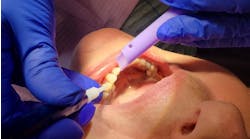Copyright Dreamstime.com
Dentists who offer sedation in their offices may welcome a host of new patients in desperate need of care. Patients are rewarded with good oral health and dentists are rewarded with a new niche for their practices. But how much risk comes along with the reward?
The level of risk assumed by the dentist and patient depends upon the level of sedation reached. It is generally accepted that there are four levels of sedation:
1. Minimal sedation (anxiolysis)
2. Moderate sedation/analgesia
(conscious sedation)
3. Deep sedation/analgesia
4. General anesthesia
ADDITIONAL READING |Does a dental practice have a common law duty to have an AED available?
Depending on the state in which a dentist practices, special training and/or certification may be required in order to legally administer medication that reaches deeper levels of sedation. The risk of complications can be reduced by having a trained dental anesthesiologist monitor the patient while a separate dentist performs the dentistry. However, some dentists may choose to provide the care and administer sedatives themselves. This is often the case with oral conscious sedation, which has risen in popularity in recent years.
Unfortunately, there have been incidences where sedation in the dental office has been linked to morbidity and mortality. Recently, two fatalities in North Carolina were blamed on conscious sedation.
Dental sedation is safe as long as dentists strictly follow protocols and guidelines that have been provided by their training. Perhaps the challenge is to ensure that the various facilities and companies that provide this training are regulated in some way. Is there a universally accepted standard of care for dental sedation?
ALSO BY DR. CHRIS SALIERNO …
3 patients who may not be candidates for complex dental care
The wrong way to restore an implant
Avoiding complications bonding lithium disilicate
Long-term provisional success for young patients who need implants
I think my implant needs a root canal








